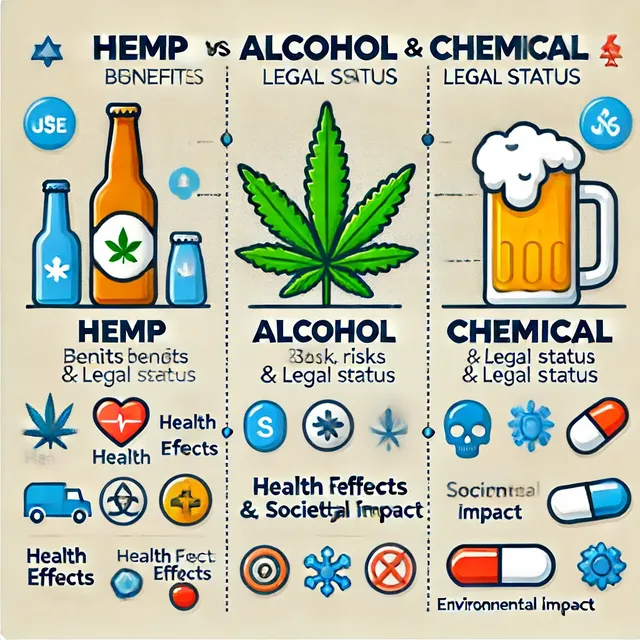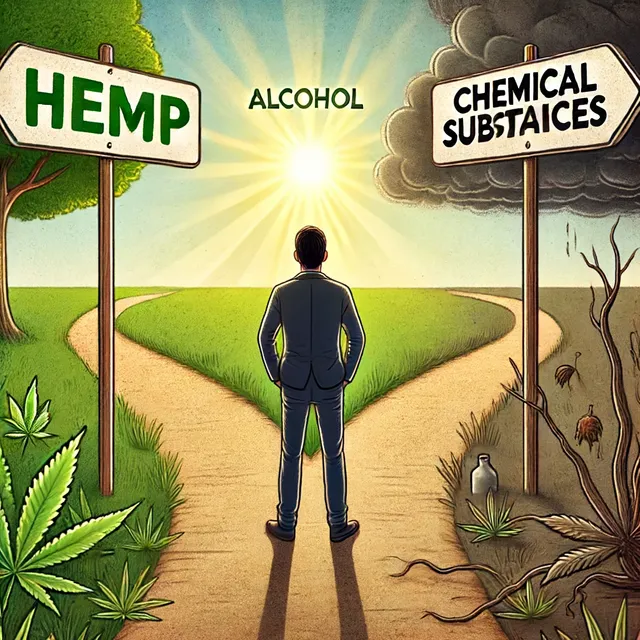In the pursuit of altering consciousness, humans have long turned to various substances to achieve a desired state of euphoria, relaxation, or heightened perception. Among the plethora of substances available, hemp, alcohol, and various synthetic chemicals stand out as the most commonly used. Each of these substances offers a unique experience and comes with its own set of benefits and risks. However, as awareness about health and wellness grows, the preference for safer and more beneficial alternatives becomes crucial. This article aims to provide an in-depth comparison of hemp, alcohol, and chemical substances, highlighting why hemp is increasingly regarded as a superior choice for a safe and enjoyable high.

Understanding the Substances 🧠
Hemp 🌿
Hemp, scientifically known as Cannabis sativa, has been used for centuries for its medicinal, industrial, and recreational properties. Unlike its psychoactive cousin marijuana, hemp contains low levels of THC (tetrahydrocannabinol), the compound responsible for the "high" in cannabis. Instead, hemp is rich in CBD (cannabidiol), a non-psychoactive compound that offers numerous health benefits without inducing a high.
- Benefits of Hemp:
- Non-Psychoactive: CBD provides therapeutic effects without the psychoactive "high" associated with THC.
- Health Benefits: Studies suggest CBD can help with anxiety, inflammation, pain, and even epilepsy. [1]
- Natural and Safe: Hemp is a natural plant with a long history of safe use.
Alcohol 🍺
Alcohol is one of the most widely used recreational substances worldwide. It is consumed in various forms, such as beer, wine, and spirits, and acts as a central nervous system depressant.
- Effects of Alcohol:
- Euphoria and Relaxation: In low doses, alcohol can cause feelings of euphoria, relaxation, and sociability.
- Impairment: Higher doses can lead to impaired motor skills, judgment, and cognitive function.
- Health Risks: Long-term alcohol use can cause liver disease, addiction, cardiovascular issues, and neurological damage. [2]
Chemical Substances 💊
Chemical substances, including synthetic drugs like ecstasy (MDMA), LSD, and methamphetamines, are often used for their powerful psychoactive effects.
- Effects of Chemical Substances:
- Intense High: These substances can cause intense euphoria, altered perception, and increased energy.
- Unpredictable Effects: The effects can vary widely and are often unpredictable, leading to dangerous outcomes.
- Health Risks: High potential for addiction, overdose, and severe physical and mental health issues. [3]
Comparing the Highs 🎢
Hemp 🌿
Hemp, particularly through its CBD component, provides a subtle and calming effect. Users report feeling relaxed and at ease without the intense psychoactive effects of THC-rich cannabis.
- Experience: Relaxation, reduced anxiety, and pain relief without a high.
- Duration: Effects can last from a few hours to all day, depending on the method of consumption.
Alcohol 🍺
Alcohol's effects are more immediate and pronounced. In moderate amounts, it can reduce inhibitions and create a feeling of euphoria. However, it quickly leads to impaired judgment and coordination with increased consumption.
- Experience: Euphoria, sociability, followed by potential impairment.
- Duration: Effects typically last for a few hours, with a peak within 30-90 minutes of consumption.
Chemical Substances 💊
Chemical substances offer a range of experiences, from the euphoric and empathogenic effects of MDMA to the intense hallucinogenic experiences of LSD.
- Experience: Highly variable; can include intense euphoria, hallucinations, and increased energy.
- Duration: Varies widely; MDMA lasts 3-6 hours, LSD 8-12 hours, and methamphetamine effects can last even longer.
Health and Safety Considerations 🛡️
![]()
Hemp 🌿
Hemp is considered one of the safest options among recreational substances. Its non-psychoactive nature and potential health benefits make it an attractive alternative.
- Safety Profile: Generally safe with few side effects; potential for mild drowsiness or dry mouth.
- Addiction Potential: Low risk of addiction or dependency.
Alcohol 🍺
Alcohol is widely accepted but comes with significant health risks, especially with long-term use.
- Safety Profile: High risk of accidents and long-term health issues; potential for alcohol poisoning.
- Addiction Potential: High risk of addiction and dependency.
Chemical Substances 💊
Synthetic drugs carry the highest risks due to their unpredictable nature and potential for severe health consequences.
- Safety Profile: High risk of overdose, mental health issues, and physical harm.
- Addiction Potential: Very high risk of addiction and dependency.
Legal and Social Acceptance 📜
Hemp 🌿
The legal status of hemp varies worldwide, but many countries are moving towards legalization and acceptance, particularly for its medicinal benefits.
- Legal Status: Legal in many places, especially for CBD products.
- Social Acceptance: Growing acceptance due to its health benefits and non-psychoactive properties.
Alcohol 🍺
Alcohol is legal and socially accepted in most cultures, despite its health risks.
- Legal Status: Legal for adults in most countries.
- Social Acceptance: High social acceptance and integration into social activities.
Chemical Substances 💊
Most synthetic drugs are illegal and stigmatized due to their high potential for abuse and harm.
- Legal Status: Illegal in most countries.
- Social Acceptance: Low social acceptance due to associated risks and criminal status.
Environmental Impact 🌍
Hemp 🌿
Hemp is environmentally friendly and sustainable. It requires fewer pesticides and less water compared to many crops, and it can be used to produce a wide range of eco-friendly products.
- Sustainability: Highly sustainable with minimal environmental impact.
- Uses: Can be used for textiles, paper, biodegradable plastics, and more.
Alcohol 🍺
Alcohol production, particularly for spirits and wine, can have significant environmental impacts, including water usage, energy consumption, and agricultural land use.
- Sustainability: Varies; some production methods are more sustainable than others.
- Uses: Primarily for consumption, with some industrial applications.
Chemical Substances 💊
The production of synthetic drugs often involves harmful chemicals and practices that can be detrimental to the environment.
- Sustainability: Low sustainability with significant environmental harm.
- Uses: Primarily for illicit consumption, with no legitimate uses.
Personal and Societal Benefits 🌟
Hemp 🌿
Hemp offers numerous personal and societal benefits, from health and wellness to economic and environmental advantages.
- Personal Benefits: Improved health, reduced anxiety, and pain relief.
- Societal Benefits: Economic growth through industrial applications, environmental sustainability, and potential for improved public health.
Alcohol 🍺
While alcohol can enhance social interactions, its personal and societal costs often outweigh the benefits.
- Personal Benefits: Temporary euphoria and social facilitation.
- Societal Benefits: Economic benefits from the alcohol industry, but significant costs related to health care and social issues.
Chemical Substances 💊
The personal and societal costs of synthetic drugs are overwhelmingly negative, with high risks of addiction, health problems, and social harm.
- Personal Benefits: Intense but short-lived euphoria.
- Societal Benefits: None; high costs related to health care, law enforcement, and social issues.
Conclusion 🎉

When comparing hemp, alcohol, and chemical substances, hemp stands out as the superior choice for a safe and enjoyable high. Its non-psychoactive nature, health benefits, and minimal risks make it an attractive alternative. Alcohol, while socially accepted, carries significant health and societal risks. Synthetic drugs offer intense but unpredictable highs with high potential for harm. As awareness about health and wellness grows, hemp emerges as a natural and beneficial option for those seeking a safe and sustainable way to enhance their well-being.
References
- CBD and Its Health Benefits: [Link to source]
- Alcohol's Health Risks: [Link to source]
- Risks of Synthetic Drugs: [Link to source]